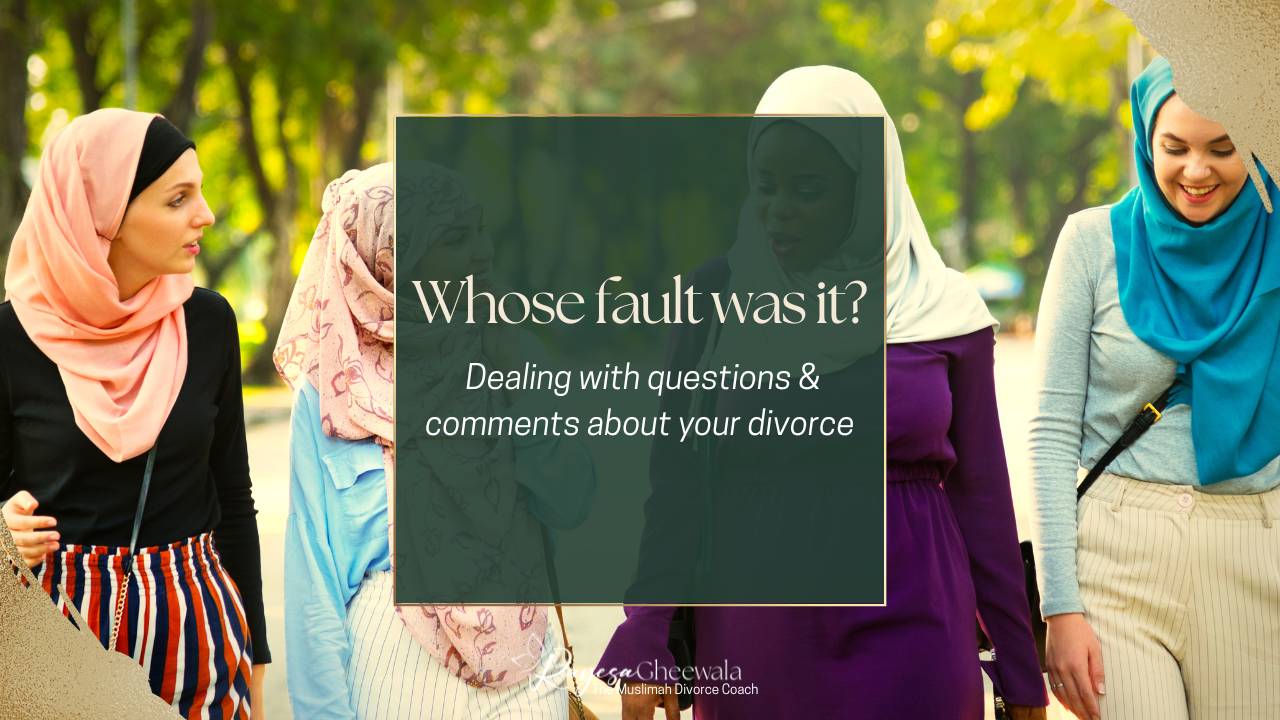
Whose fault was it? Dealing with questions & comments about your divorce
Feb 18, 2019
It’s a very common feeling when going through a divorce to want to isolate yourself because you don’t feel safe going out and about in your social circles. That’s usually because of all the questions that you get asked about the divorce, such as, ‘Was it mutual?’ or ‘Whose fault was it?’
It may feel as if everyone is playing the blame and shame game and trying to point the finger. But even for those around us who are more well-intentioned, it can still feel upsetting when they say things like, ‘sorry for your loss’ or, ‘you poor thing’.
And, it’s understandable.
Everyone feels a sense of sadness when a marriage ends, even if it wasn't a healthy one to begin with (it’s even worse when the marriage was abusive but no one knew).
So, how do you respond?.
Let’s explore how to handle uncomfortable or hurtful comments and questions about your divorce.
Pay attention to the emotions and let them flow
When you get asked questions about your divorce, of course, it can bring up some very uncomfortable feelings and make you feel as if you’re being put on the spot.
Sometimes, the situation triggers all the emotions you had from when you were still married up to the point of being divorced - all the sadness, anger, guilt, disappointment, blame and shame.
Now, the first thing you need to do is ask yourself is, ‘what comes up within me?’
Whatever feelings come up, don’t suppress them. Instead, recognize them, acknowledge them and allow yourself to feel them. We're designed to feel all the emotions, even the ones that make us feel uncomfortable or hurt.
Allow yourself to feel the anger, sadness, pain and disappointment without blaming or hooking those feelings onto someone or something (circumstance, situation). Because if you don’t, those emotions can harm you from the inside and manifest as physical symptoms such as pain in your body - like your stomach, head or neck.
Understand where your emotions come from
When you look within and allow yourself to experience all the emotions that come up, the intense feelings subside faster as opposed to suppressing and avoiding the feeling.
The truth is:
What you are feeling is coming from your thinking in the present moment.
You’re probably wondering what I mean by that.
See, when someone makes a comment, that is simply their opinion. It is not fact. You don’t have to own those comments or take them on as your truth. You have the right to answer any way you wish and you also have the right to not answer at all.
What is important, is to ask yourself what are your beliefs about divorce and being a divorced woman. When you uncover these ingrained beliefs it exposes the the story that is being played out in your mind, causing you to feel how you’re feeling!
Believe it or not, it is not the comments or the questions people are asking. It is the thinking around those comments.
Be prepared to challenge those beliefs
When we understand that our feeling is coming from our thinking, it helps us to be aware of how we are thinking about divorce. What does it means to be a divorced woman and how does it affect your status in society?
Now you may not even know what you’re beliefs are. They may be so subconsciously ingrained that you may not even be aware of them. It may just be the “norm” that you’ve been programmed with. But you need to know what they are and where those beliefs are coming from.
Are they coming from the Quran and the sunnah? Or are they coming from culture, society, patriarchy? Once you know where they are coming from, then the next step is - challenging those beliefs.
Can you look at them for what they are and determine if they are true or beneficial? Are they in line with what the prophet Muhammad (pbuh) teaches about relationship statuses, whether you’re married, divorced or widowed? And is it in line with how Allah views you, your value and worth as a human being?
Look, you have absolutely no control over what people say or how they behave. The only thing that you have control over is your mind, how you’re thinking and your actions. When you withdraw from the entire community, you shut yourself out from experiencing possible hurt, but you also shut yourself out from receiving support. And in doing so, you might even be oppressing yourself.
So, when you become aware of your thinking about your divorce you can give yourself the opportunity to reflect on what your beliefs are. You can challenge those beliefs and even have a different perspective than before.
I hope this was helpful in getting you out of the state of feeling inferior because you're going through a divorce. Don’t give others the power to “make you feel” a certain way because your feelings come from your own thoughts. It's an inside job.
Leave a comment below if you have any questions and reach out to me if you would love any additional support from me.
If you're interested in working with me and want to connect to learn more about my programs, let's get on a call to see if we'd be a good fit!

